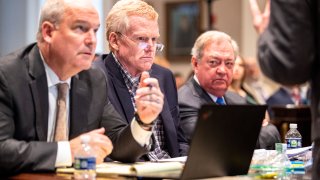
“I did him so bad.”
That's what a South Carolina investigator on Monday testified that Alex Murdaugh had uttered between sobs during a recorded interview three days after Murdaugh's wife and son were killed.
But to others inside and outside the courtroom, it sounded like Murdaugh said, “They did him so bad,” on the audio from a police interview that was played at the disgraced attorney’s double murder trial after he was asked about a picture of his son’s body.
Court ended Monday before the defense could cross-examine the agent.
Get top local stories in DFW delivered to you every morning. Sign up for NBC DFW's News Headlines newsletter.
Earlier in the day, defense attorneys continued to question the way state authorities collected and analyzed evidence in the shooting deaths of Murdaugh's wife and son.
Murdaugh, 54, is standing trial on two counts of murder in the shootings of his wife and son at their Colleton County home and hunting lodge on June 7, 2021. His wife, Maggie, 52, was shot several times with a rifle; their son Paul, 22, was shot twice with a shotgun near kennels on the property. Murdaugh faces 30 years to life in prison if convicted.
In the interview played Monday, Murdaugh spoke to the state agent at his brother's house for about an hour three days after the killings. Murdaugh's lawyer was close by.
U.S. & World
Prosecutors paused the video several times to give State Law Enforcement Division Senior Special Agent Jeff Croft a chance to emphasize some of Murdaugh’s comments. At one point, Murdaugh said his wife was home hours before the killings when he and his son returned from riding around the property. Later in the interview, Murdaugh could be heard saying “It’s just so bad,” before the unclear comment that Croft said sounded like Murdaugh was implying he had killed his son.
In court, Murdaugh appeared to shake his head no when Croft said what he heard.
Murdaugh also broke into sobs on the 2021 recording after mentioning a small disagreement he had with his wife over visiting her family.
“She was a wonderful girl and a wonderful wife. And she was a great mother,” Murdaugh said.
Monday started with cross-examination of another state agent who testified at length about evidence collected from the Murdaugh home and property.
Similarly to the previous days of testimony, officers and crime scene technicians presented evidence to the jury that investigators will likely later explain in more detail. Prosecutors described their case as a puzzle in last week's opening statement.
While cross-examining witnesses, though, defense attorneys have asked questions suggesting the metaphorical puzzle pieces either aren't clear or prosecutors aren't putting them all on the table.
State Law Enforcement Division Special Agent Melinda Worley testified Friday about photographs of the bodies, shotgun pellets and DNA swabs from the scene as well as clothes and fingernail clippings from the autopsies.
In Monday's cross-examination, defense attorney Dick Harpootlian honed in on several items, including identifying footprints, one of Worley's specialties. She told him one of the footprints in blood near where Murdaugh's son was shot came from a deputy.
“Is that the preservation of the scene that your standards require?" Harpootlian asked.
“Not exactly, no," Worley responded.
Harpootlian also had Worley come off the stand and work on a rough diagram of the angles of the shots fired at Paul and Maggie Murdaugh, pointing out a significant disparity between the directions the shots at each victim came from.
Worley said that can happen when a shooter is moving.
“One explanation would be movement. One explanation would be two shooters,” Harpootlian said.
Alex Murdaugh continued to rock and dab his eyes during more graphic testimony, including when Harpootlian showed a photo of his wife's body to ask Worley if there could have been a shoeprint on his wife's calf that was not formally documented as the scene was examined.
Worley said she couldn't be certain.
Croft was one of the chief agents investigating the double killings and also testified about guns, ammunition, and fired casings gathered from the Murdaugh home after the killings, showing at least four different shotguns and rifles to the jury and testifying that the Murdaughs kept the weapons loaded in their gun room.
In his interview, Murdaugh told Croft that his son was unfocused and would stay with family and friends across the state, leaving his possessions behind instead of bringing them home.
“He did that with clothes, he did that with guns he did that with my boats," Murdaugh said.
Prosecutors in their opening statement said the guns that killed Paul and Maggie Murdaugh have not been found, but markings on casings found around the home that may have been used for target practice matched casings found at the scene.
Alex Murdaugh also faces about 100 charges related to accusations of money laundering, stealing millions from clients and the family law firm, tax evasion and trying to get a man to fatally shoot him so his surviving son could collect a $10 million life insurance policy. He was being held in jail without bail on those counts before he was charged with murder.
Since the killings, Murdaugh’s life has seen a stunningly fast downfall. His family dominated the legal system in tiny neighboring Hampton County for generations, both as prosecutors and private attorneys known for getting life-changing settlements for accidents and negligence cases.



